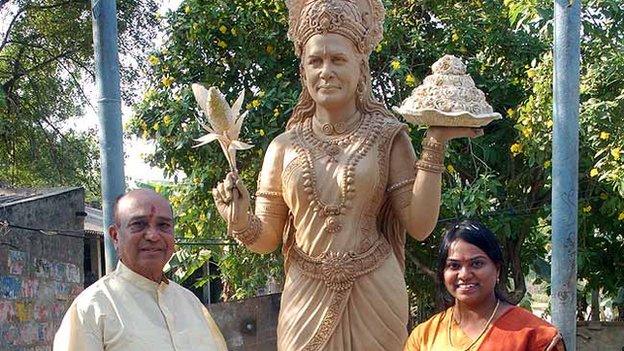Profile: Sonia Gandhi
- Published
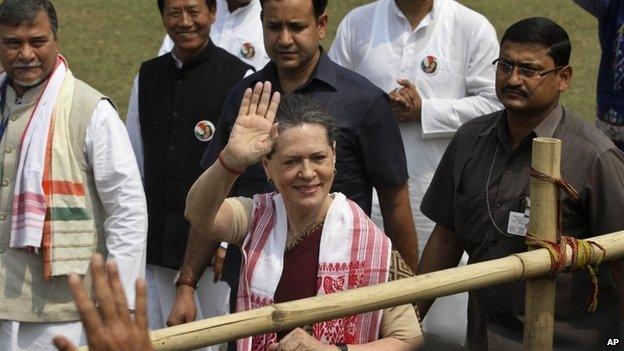
Sonia Gandhi was the de facto head of the government during Congress's term in office
Italian-born Sonia Gandhi, the president of India's ruling Congress party and head of the Nehru-Gandhi dynasty, was arguably the most powerful woman in India while Congress was in power.
Her power derived from being the head of the dynasty which has dominated Indian politics and the Congress party which has ruled India for most of the years since becoming an independent nation in 1947.
The 67-year-old Mrs Gandhi held no official post, but many considered her the de facto head of the Congress government. After its worst ever showing in 2014's general election, she said she and her son Rahul - who had led Congress campaign - accepted responsibility for the result.
The party suffered a backlash against a spate of corruption scandals and its handling of the economy and faced a resurgent Bharatiya Janata Party (BJP) led by Narendra Modi.
After the scale of the party's defeat became clear, Mrs Gandhi said: "This mandate is clearly against us, our party. We accept this decision of the electorate with respect.
"The Congress party faced its opponents on the basis of its achievements, policies and principles. But we didn't get the mandate we expected," she said.
In recent months, Mrs Gandhi has faced some health issues - in 2011, she had surgery in the US for an undisclosed medical condition and in 2013 she was rushed to hospital from parliament looking ill and unsteady.
Though her son and Congress vice-president Rahul Gandhi led the party's campaign for the 2014 elections, Mrs Gandhi's influence over the party has never been in doubt.
The widow of former PM Rajiv Gandhi would have become India's first Roman Catholic prime minister had she not surprised everyone by turning down the post after her general election success in 2004.
She is widely considered to be the main backer of the party's welfare schemes including a landmark food-for-work scheme often described as India's New Deal.
She also strongly backed the right to information, food and education laws and the demand for a new state of Telangana and described a 153-year-old law that criminalises homosexuality as "an archaic, unjust law".
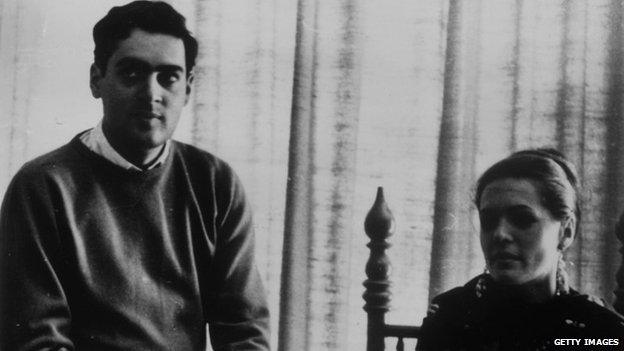
Sonia Gandhi (right) met her future husband Rajiv Gandhi (left) at Cambridge university
However, critics questioned her political management skills and say she depended on party managers to take key decisions.
They say that under her curious alliance with technocrat Prime Minister Manmohan Singh, crises were allowed to develop, leading to a drift in government.
Before the surprise 2004 election win, Mrs Gandhi's future in Indian politics had looked somewhat uncertain.
After distancing herself from politics following her husband's assassination in 1991, Mrs Gandhi was initially seen as a reluctant and almost reclusive politician.
She officially took charge of the Congress party in 1998 and was elected to parliament in 1999.
Combative
Under her leadership, the party turned in its second worst performance since independence in the 1999 elections, but won the general elections in 2004 and 2009. The party performed indifferently in state elections in 2003 and 2013.
Though she turned down the post of PM, Mrs Gandhi shed her formerly taciturn manner, routinely working the crowds at political meetings and displaying a more combative approach.
In 2004, her opponents attempted to rake up her Italian descent as an election issue, but their campaign remained unsuccessful.
Long before the election she had surrendered her Italian passport in favour of full Indian citizenship.
Mrs Gandhi herself said in a television interview: "I never felt they look at me as a foreigner. Because I'm not. I am Indian."
Born Sonia Maino on 9 December 1946 in the town of Orbassano, near Turin, to a building contractor and his wife, she was raised in a traditional Roman Catholic household. Her mother and two sisters still live in Orbassano.
In 1964 she went to Cambridge to study English at a language school.
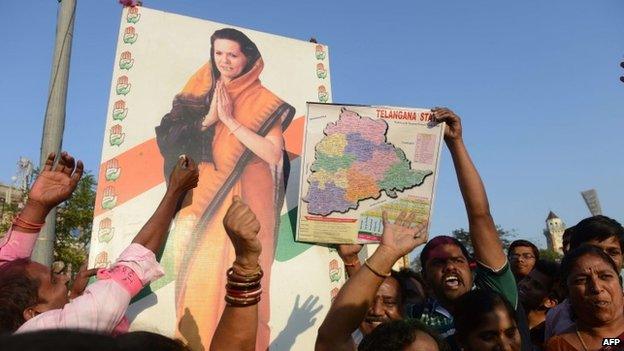
Sonia Gandhi backed the creation of the new state of Telangana
Her life changed forever when she met her future husband, Rajiv Gandhi, who was studying engineering at the university.
The couple married in 1968 and she moved into the house of her mother-in-law and then Prime Minister Indira Gandhi.
She initially disliked Indian food and clothes and caused controversy when she was photographed wearing a miniskirt.
But she spent the 1970s becoming steeped in Indian culture. Although she has learned Hindi, she is not a fluent speaker of the language.
She no doubt also watched and learned as Indira Gandhi fought a variety of political battles.
In 1984 Indira Gandhi was assassinated by her Sikh bodyguards in retaliation for her decision to send troops into their holiest shrine, the Golden Temple.
Sonia was propelled into the forefront of the political scene as Rajiv was picked as the successor to the Gandhi-Nehru crown.
Tragedy
Rajiv became prime minister, but seven years later tragedy struck the Gandhi family again - he was killed by a Tamil suicide bomber at a rally in Tamil Nadu in 1991.
Mrs Gandhi resisted Congress attempts to persuade her to step into Rajiv's shoes and eschewed politics for several years.
Eventually, in 1998, she agreed to become more involved but her initial efforts were overshadowed by the Congress's humiliating defeat at the hands of the BJP in the 1999 election.
In August 2000, she became a grandmother for the first time when daughter Priyanka gave birth to a son.
Earlier that year she asked a court to grant clemency to a woman who had played a part in the bomb attack that killed Rajiv.
The bomber, Nalini, had appealed for mercy on the grounds that her seven-year-old daughter would be orphaned if she was hanged.
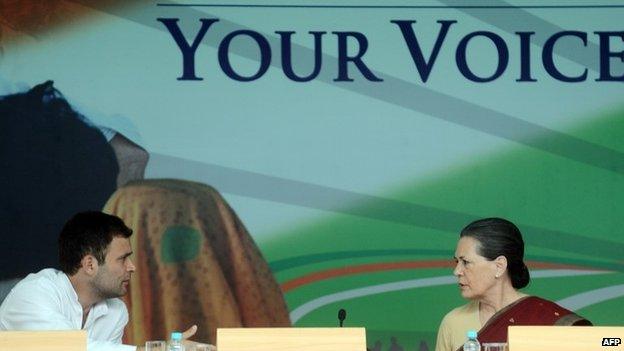
Though her son Rahul Gandhi (left) led the party's campaign for the 2014 elections, Ms Gandhi's influence over the party has never been in doubt
The court later commuted Nalini's death sentence.
Mrs Gandhi is a familiar figure in Amethi, her husband's rural parliamentary constituency in the northern state of Uttar Pradesh which her son Rahul now represents. She herself has represented the neighbouring seat of Rai Bareilly.
She suffered a minor setback in 2006 when she had to surrender her membership of parliament, following allegations that she was violating rules by profiting from a second public post.
She won a by-election later in the year to return to parliament.
- Published9 November 2012
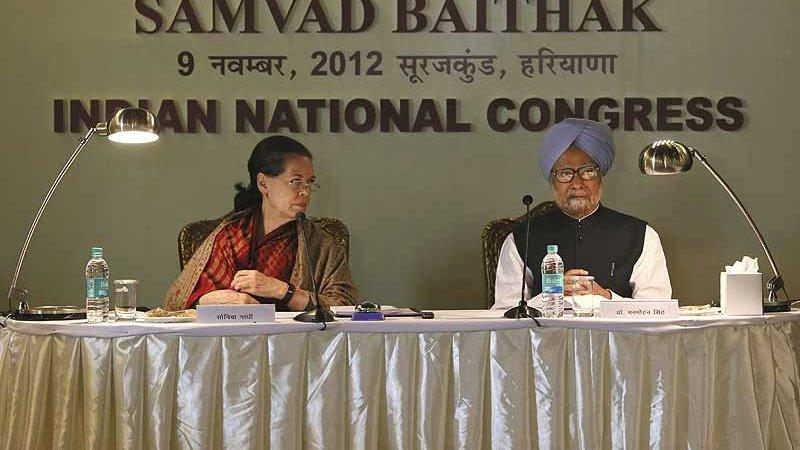
- Published9 January 2014
